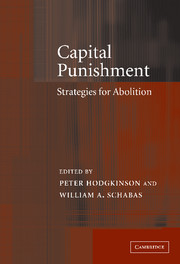Book contents
- Frontmatter
- Contents
- List of figures
- List of tables
- Notes on the contributors
- 1 Capital punishment: improve it or remove it?
- 2 International law and the death penalty: reflecting or promoting change?
- 3 Doctors and the death penalty: ethics and a cruel punishment
- 4 Replacing the death penalty: the vexed issue of alternative sanctions
- 5 Religion and the death penalty in the United States: past and present
- 6 On botched executions
- 7 Death as a penalty in the Shari'ā
- 8 Abolishing the death penalty in the United States: an analysis of institutional obstacles and future prospects
- 9 Capital punishment in the United States: moratorium efforts and other key developments
- 10 The experience of Lithuania's journey to abolition
- 11 The death penalty in South Korea and Japan: ‘Asian values’ and the debate about capital punishment?
- 12 Georgia, former republic of the USSR: managing abolition
- 13 Capital punishment in the Commonwealth Caribbean: colonial inheritance, colonial remedy?
- 14 Public opinion and the death penalty
- 15 Capital punishment: meeting the needs of the families of the homicide victim and the condemned
- Index
10 - The experience of Lithuania's journey to abolition
Published online by Cambridge University Press: 22 September 2009
- Frontmatter
- Contents
- List of figures
- List of tables
- Notes on the contributors
- 1 Capital punishment: improve it or remove it?
- 2 International law and the death penalty: reflecting or promoting change?
- 3 Doctors and the death penalty: ethics and a cruel punishment
- 4 Replacing the death penalty: the vexed issue of alternative sanctions
- 5 Religion and the death penalty in the United States: past and present
- 6 On botched executions
- 7 Death as a penalty in the Shari'ā
- 8 Abolishing the death penalty in the United States: an analysis of institutional obstacles and future prospects
- 9 Capital punishment in the United States: moratorium efforts and other key developments
- 10 The experience of Lithuania's journey to abolition
- 11 The death penalty in South Korea and Japan: ‘Asian values’ and the debate about capital punishment?
- 12 Georgia, former republic of the USSR: managing abolition
- 13 Capital punishment in the Commonwealth Caribbean: colonial inheritance, colonial remedy?
- 14 Public opinion and the death penalty
- 15 Capital punishment: meeting the needs of the families of the homicide victim and the condemned
- Index
Summary
Introduction
On the eve of the tenth anniversary of the re-establishment of the independent Lithuanian state, the popular magazine Veidas published the results of opinion polls about public attitudes to the Soviet past. Respondents from five main Lithuanian cities were asked about possible associations with the Soviet Union, and the majority of them (52 per cent) pointed to violations of human rights. This not only perfectly describes Lithuanians' attitude to the authoritarian past, but also indirectly shows that among the population the human rights issue after ten years of independence is firmly associated with democratic progress in society. Lithuania, together with many of its neighbours from Central and Eastern Europe, belongs to the so-called post-communist part of the world; together these countries face the challenges which characterise the transition from an authoritarian regime to democracy.
On the road to an open and civil society, Lithuania, as with many other Central and Eastern Europe countries, has had to solve a paradoxical problem: how to implement Western democratic ideas in a society that experienced the adverse impact of the previous anti-democratic institutional structures. At first, stimulated by optimism, there were many illusions about the prospects for a liberal and humanistic future for the country. However, this optimism quickly came up against social and political realities. Ackermann, who in 1992 noted the receptiveness of Eastern Europeans to liberal democratic ideas, wrote that ‘it is one thing … to affirm the enduring significance of freedom and the rule of law’, but ‘quite another to translate these values into enduring political structures’.
- Type
- Chapter
- Information
- Capital PunishmentStrategies for Abolition, pp. 233 - 252Publisher: Cambridge University PressPrint publication year: 2004



